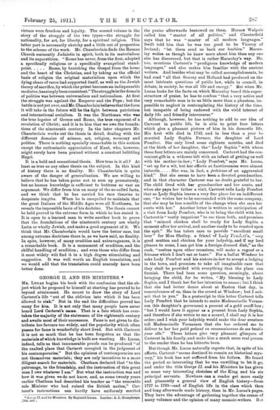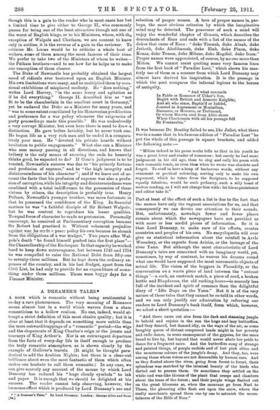GEORGE II. AND HIS MINISTERS.
Mn. Lucas begins his book with the confession that the ob- ject which he proposed to himself at starting has proved to be beyond attainment. He meant to draw the story of Lord Carteret's life " out of the oblivion into which it has been allowed to silk." But in the end the difficulties proved too many for him. It is not only that many people have never heard Lora Oarteret's name. That is a fate which has over- taken the majority of the statesmen of the eighteenth century and awaits most of their successors. Fame is not given to dis- tribute her favours too widely, and the popularity which often passes for fame is wonderfully short lived. But with Carteret it is not so much that he has been forgotten as that the materials of which knowledge is built are wanting. Mr. Lucas, indeed, tells us that innumerable proofs can be produced "of the exalted place that Carteret occupied in the judgment of his contemporaries." But the opinions of contemporaries are not themselves materials; they are only incentives to a more diligent search for materials. Chatham declared that " to the patronage, to the friendship, and the instruction of this great man I owe whatever I am." But what the instruction was and how it was given we do not know, and, as some twenty years earlier Chatham had described his teacher as " the execrable sole Minister who had ruined the British nation," Car- teret's instructions can hardly have uniformly merited * George H. and his Ministers. By Reginald Lucas. London: A. L. Humphreys. [10e. net. I
the praise afterwards bestowed on them. Horace Walpole called him " master of all politics," and Chesterfield says that he was " master of all modern languages." Swift told him that he was too good to be Viceroy of Ireland; "let them send us back our boobies." Macau- lay writes as though he knew more about him than any one else has discovered, but that is rather Macaulay's way. He, too, mentions Carteret's "prodigious knowledge of modern languages," and also makes him familiar with the ancient writers. And besides what may be called accomplishments, he had read " all that Saxony and Holland had produced on the most intricate questions of public law, while in council, in debate, in society, he was all life and energy." But when Mr. Lucas looks for the facts on which Macaulay based this super- structure of praise, he has to confess " that a very active and very remarkable man is to us little more than a phantom, im- possible to neglect in contemplating the history of the time, but incapable of being endowed with the vivid interest of daily life and friendly intercourse."
Although, however, he has nothing to add to our idea of Carteret in public life, he is able to print four letters which give a pleasant picture of him in his domestio life, His first wife died in 1743, and in less than a year he married Lady Sophia Fermor, the daughter of Lord Pomfret. She only lived some eighteen months, and died at the birth of her daughter, the " Lady Sophia " with whom these four letters are mainly concerned. Carteret had the con- venient gift in a widower left with an infant of getting on well with his mother-in-law ; " Lady Pomfret," says Mr. Lucas, "set up for a wit, but her efforts at facetiousness were almost
imbecile She was, in fact, a ftrlcieuae of an aggravated kind." But she seems to have been a devoted grandmother, and in that character Carteret was no doubt grateful to her. The child lived with her grandmother and her aunts, and when she pays her father a visit, Carteret tells Lady Pomfret that as Lady Sophia leaves a very fine place for an indifferent one, " he wishes her to be surrounded with the same company, that she may be less sensible of the change when she sees her aunts with her." Another letter is written in anticipation of a visit from Lady Pomfret, who is to bring the child with her. Carteret is " vastly impatient" to see them both, and promises that "minced chicken shall be ready for Lady Sophia, a moment after her arrival, and another ready to be roasted upon the spit." He has taken care to provide " excellent small beer" for Miss Shelley, a friend- of Lady Pcmf,r,t's, " very good mutton and chicken for your ladyship, and if my lord pleases to come, I can get him a foreign-dressed dish," as the cook, "useless upon other occasions, will make a ragout or a fricasse which I don't eat or taste." For a ballet Windsor he asks Lady Pomfret and his sisters-in-law to accept a lodging in the town, and promises to take all imaginable care that they shall be provided with everything that the place can furnish. There had been some question, seemingly, about bringing the child, for he writes, "My blessing to Lady Sophia, and I thank her for her intention to dance i- but 1 think that she had better dance about at Easton that day, in remembrance of us, than in the crowd at Windsor ; but I sub- mit that to you." In a postscript to this letter Carteret tells Lady Pomfret that he intends to make Mademoiselle Vernas- son (his daughter's governess) a present of a gold snuff-box ; "but I would have it appear as a present from Lady Sophia, and therefore if she writes to me a scrawl, I shall say it is her order; and I wish your ladyship would make the dear creature tell Mademoiselle Vernasson that she has ordered me to deliver to her her petit present en reconnaissance de sea &rates tour elle." These letters give very pleasant glimpses of Carteret in his family, and make him a much more real person to the reader than he has hitherto been.
But though Mr. Lucas naturally regrets that, in spite of his efforts, Carteret " seems destined to remain an historical mys- tery," his book has not suffered from his failure. He found the period so interesting that he was unwilling to let it go, and under the title George II. and his Ministers he has given us some very interesting sketches of the King and his six principal servants. Nowhere can a reader get more easily and pleasantly a general view of English history—from 1727 to 1760—and of English life in the class which then and long afterwards made history, than in Mr. Lucas's pages. They have the advantage of gathering together the cream of many volumes and the opinion of many memoir-writers. But though this is a gain to the reader who in most oases has but a limited time to give either to George IL, who commonly passes for being one of the least attractive though not one of the worst of English kings, or to his Ministers, whom, with the exception of Walpole and Chatham, we are content to know only in outline, it is the reverse of a gain to the reviewer. To criticise Mr. Lucas would be to criticise a whole host of writers, some of them among the most famous of their time. We prefer to take two of the Ministers of whom he writes— the Pelham brothers—and to see how far he helps us to make our conception of them clearer.
The Dake of Newcastle has probably obtained the largest need of ridicule ever bestowed upon an English Minister. His own limitations were many, and be multiplied them by occa- sional exhibitions of misplaced modesty. He " does nothing," writes Lord Hervey, "in the same hurry and agitation as if he did everything." George II. described him as " not fit to be the chamberlain in the smallest court in Germany," yet he endured the Duke as a Minister for many years, and " was to some extent conciliated by his Hanoverian predilection and preference for a war policy whenever the exigencies of party proceedings made this possible." He was undoubtedly a very corrupt Minister, but even here there is need to draw a distinction. He gave bribes lavishly, but he never took one. He began life as a very rich man and he ended it a compara- tively poor man. He " devoted his private hoards without hesitation to public engagements." W hat else can a Minister who sees money passing in all directions, and knows that bribery is the only means of securing the ends he honestly thinks good, be expected to do? If Core's judgment is to be trusted, Newcastle's success was due to " his princely fortune and profusion of expense," and to "the high integrity and disinterestedness of his character" ; and if we leave out of ac- count the facts that his profusion of expense was also a profu- sion of corrnption,while his integrity and disinterestedness were combined with a total indifference to the possession of these virtues by others, the description is probably true. Henry Pelham, Newcastle's younger brother, was more fortunate in that he possessed the confidence of the King. In financial matters he was " a faithful disciple of Sir Robert Walpole; but he was content to reproduce his lesser qualities. To equal force of character he made no pretension. Personally uncorrupt, he connived at Parliamentary corruption because Sir Robert had practised it. Without vehement prejudice egainst war. he =de e. peace policy his own because he shrank from the obligations of a war Budget." Two years after Wal- pole's death " he found himself pushed into the first place"— the Chancellorship of the Exchequer. In that capacity he worked hard to keep down extravagance, but between 1743 and 1754 he was compelled to raise the National Debt from fifty-one to seventy-three millions. But he kept down the ordinary ex- penses of the country, and in his last Budget, apart from the Civil List, he had only to provide for an expenditure of some- thing under three millions. Those were happy days for a Finana Minister.







































 Previous page
Previous page